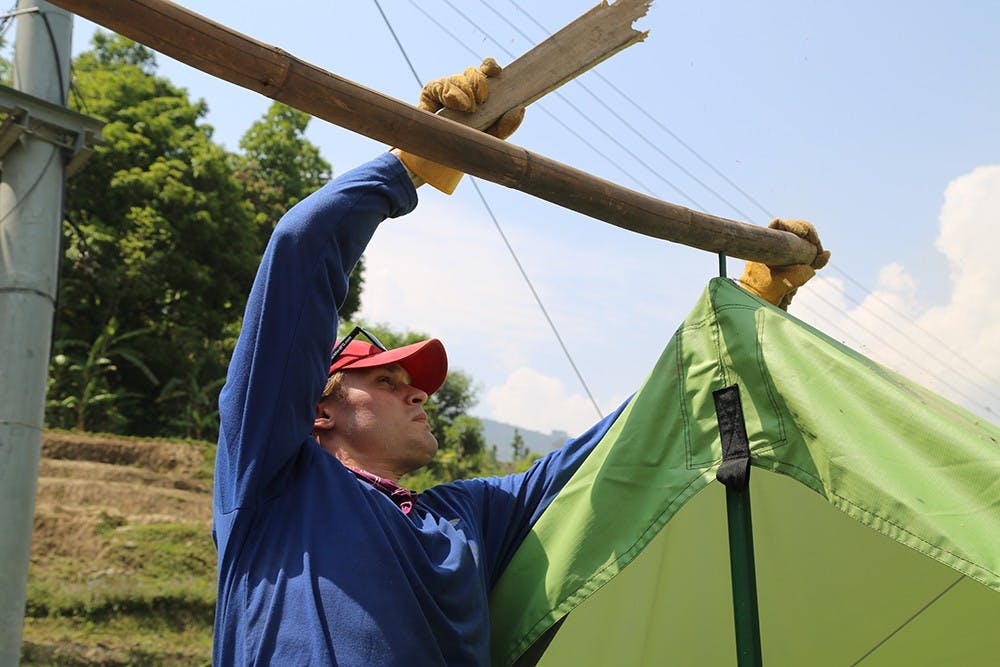An ASU alumnus and Arizona native left the desert to help build maternity wards in Nepal after the country was devastated with an earthquake last spring.
Eric Moffet, 30, began traveling abroad after graduating with a master's in liberal studies from ASU.
When the earthquake hit Nepal last April, Moffet had already begun doing outreach work. He was in Bududa, Uganda, working with a community-based organization focused on providing pediatric care to more than 1,000 children each week when he heard about the earthquake.
“I was already headed (to Nepal) in three weeks anyway, so it was a no-brainer to buy a ticket and head over immediately,” Moffet said.
Moffet said his desire to help transcended all else, and he even missed his brother’s college graduation at ASU to rush to Nepal.
His travels “completely reoriented” his life, and that is what led him to collaborate with various groups to improve the conditions in Nepal, Moffet said.
In an effort to reduce the infant mortality rate, Moffet worked with the Midwifery Society of Nepal to establish clean birthing centers and provide care supplies to new mothers.
“We’d go out to especially remote and high-need areas. ... We would go to places where health posts were completely destroyed and completely unusable,” he said.
Moffet said he was amazed by the teamwork among all the people involved in the effort to “give (the kids) a shot, or a better shot, through the neonatal period.”
One of the teams Moffet worked with was Helping Assist Nepal’s Disabled. This organization was founded by Brian Smith after making a near-fatal climb of Mount Everest, during which his eyes were opened to the terrible conditions in Nepal.
“(Moffet) was instrumental in planning, negotiating and executing our plans,” Smith wrote in an email. “In addition, he was an amazing team player in harsh conditions of heavy monsoon rains, in erecting the tents and meeting with the mothers actually birthing.”
HAND’s mission is to assist those in Nepal suffering from disabilities of all kinds with a special focus on helping children whose parents are disabled.
If the work being done in Nepal seems far-reaching, it is because of the vast array of issues to be addressed there.
“The work is often heartbreaking,” Smith wrote. “I see things that are not common here in the USA. Incredible birth defects. Starvation. Social stigma. Superstition. Fear.”
The life expectancy in Nepal alone is indicative of the conditions there.
“During my work after the second 7.3 (magnitude) May 12th earthquake with the Nepal Army Ranger Special Forces, I was told that the average life expectancy in the villages I wandered through was 49,” Smith wrote. “I was an old man on their scale. Those that I interviewed were my age, and truly the old of the village. I guessed them to be in their 80s or 90s based on appearance. They told me their true age was in the 50s.”
Ep 2: Nepal Earthquake Response from Global Orphan Prevention on Vimeo.
Founder of the non-profit organization Global Orphan Prevention Katie Hilborn has since continued Moffet's work in Nepal and expanded the mission to address the issue of child trafficking.
Hilborn and her team have been responding to crisis calls in the remote mountain village of Shikharbesi where a strong caste-style system allows powerful individuals to lure young married women into prostitution without consequence.
Unable to read or write, these girls “don’t know any better” than to follow these individuals and their feigned promises of work and a future, Hilborn said.
Hilborn said the trafficking was curbed for a time by police posts that were set up, but when the earthquake hit, the posts were down and girls began being strategically taken.
“Talking with these people opened my eyes to the horrible things people can do to one another,” Hilbron said. “I’ve seen grown men cry because their daughters were taken.”
Now, Hilborn and her team are planning a third phase of the Nepal mission to provide entrepreneurial opportunities for these people to help themselves out of poverty, provide their children with education and reduce the risk of abduction.
“The silver lining is that the earthquake was able to bring my attention to issues in Nepal I would have never known about,” Hilborn said. “I’ll always have a stake in Nepal.”
Related Links:
ASU student travels to Syria for humanitarian efforts
Students create mentoring program for foster children
Reach the reporter at icastil3@asu.edu or follow @isabella_m_cast on twitter
Like The State Press on Facebook and follow @statepress on Twitter




